Research Proposal: Analyzing Mental Illness in the Elderly Population
VerifiedAdded on 2023/06/11
|7
|1224
|462
Report
AI Summary
This research proposal investigates the relationship between mental illness and aging, addressing a critical issue given the increasing prevalence of mental health problems among the elderly. The study aims to explore the correlation between age and mental health, focusing on factors such as environment, adaptive ability, culture, and support systems. It references existing research highlighting the prevalence of depression among older Australians and the need for proactive planning to mitigate mental health risks in baby boomers. The proposal outlines key definitions, theoretical perspectives grounded in Erikson's development aging theory, and potential limitations related to fieldwork time. Ultimately, the research seeks to provide insights into managing the impact of aging on mental stability and contribute to a better understanding of mental health in the elderly population. Desklib provides access to similar research papers and study tools for students.

Research proposal
“The relationship between mental illness and ageing”
“The relationship between mental illness and ageing”
Paraphrase This Document
Need a fresh take? Get an instant paraphrase of this document with our AI Paraphraser
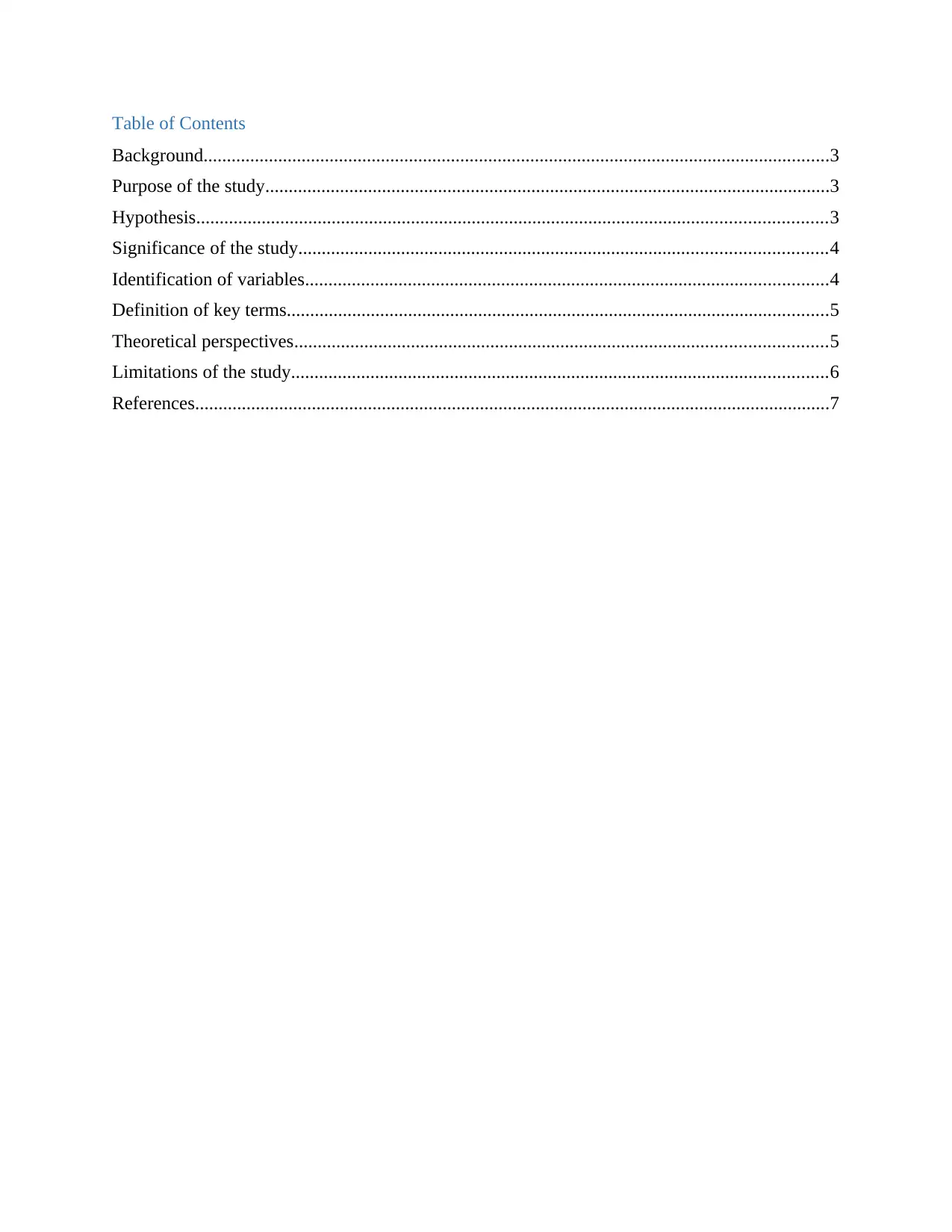
Table of Contents
Background......................................................................................................................................3
Purpose of the study.........................................................................................................................3
Hypothesis.......................................................................................................................................3
Significance of the study.................................................................................................................4
Identification of variables................................................................................................................4
Definition of key terms....................................................................................................................5
Theoretical perspectives..................................................................................................................5
Limitations of the study...................................................................................................................6
References........................................................................................................................................7
Background......................................................................................................................................3
Purpose of the study.........................................................................................................................3
Hypothesis.......................................................................................................................................3
Significance of the study.................................................................................................................4
Identification of variables................................................................................................................4
Definition of key terms....................................................................................................................5
Theoretical perspectives..................................................................................................................5
Limitations of the study...................................................................................................................6
References........................................................................................................................................7
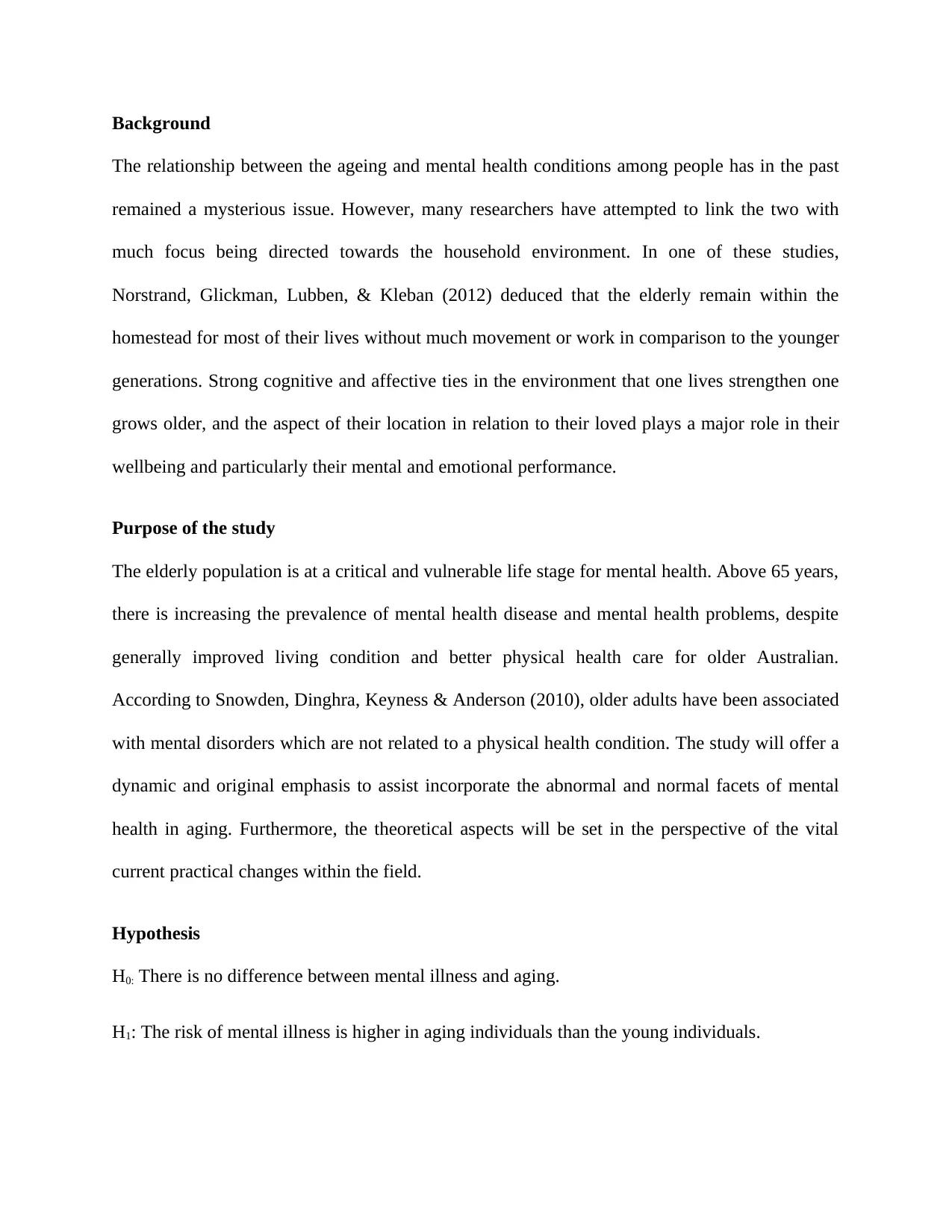
Background
The relationship between the ageing and mental health conditions among people has in the past
remained a mysterious issue. However, many researchers have attempted to link the two with
much focus being directed towards the household environment. In one of these studies,
Norstrand, Glickman, Lubben, & Kleban (2012) deduced that the elderly remain within the
homestead for most of their lives without much movement or work in comparison to the younger
generations. Strong cognitive and affective ties in the environment that one lives strengthen one
grows older, and the aspect of their location in relation to their loved plays a major role in their
wellbeing and particularly their mental and emotional performance.
Purpose of the study
The elderly population is at a critical and vulnerable life stage for mental health. Above 65 years,
there is increasing the prevalence of mental health disease and mental health problems, despite
generally improved living condition and better physical health care for older Australian.
According to Snowden, Dinghra, Keyness & Anderson (2010), older adults have been associated
with mental disorders which are not related to a physical health condition. The study will offer a
dynamic and original emphasis to assist incorporate the abnormal and normal facets of mental
health in aging. Furthermore, the theoretical aspects will be set in the perspective of the vital
current practical changes within the field.
Hypothesis
H0: There is no difference between mental illness and aging.
H1: The risk of mental illness is higher in aging individuals than the young individuals.
The relationship between the ageing and mental health conditions among people has in the past
remained a mysterious issue. However, many researchers have attempted to link the two with
much focus being directed towards the household environment. In one of these studies,
Norstrand, Glickman, Lubben, & Kleban (2012) deduced that the elderly remain within the
homestead for most of their lives without much movement or work in comparison to the younger
generations. Strong cognitive and affective ties in the environment that one lives strengthen one
grows older, and the aspect of their location in relation to their loved plays a major role in their
wellbeing and particularly their mental and emotional performance.
Purpose of the study
The elderly population is at a critical and vulnerable life stage for mental health. Above 65 years,
there is increasing the prevalence of mental health disease and mental health problems, despite
generally improved living condition and better physical health care for older Australian.
According to Snowden, Dinghra, Keyness & Anderson (2010), older adults have been associated
with mental disorders which are not related to a physical health condition. The study will offer a
dynamic and original emphasis to assist incorporate the abnormal and normal facets of mental
health in aging. Furthermore, the theoretical aspects will be set in the perspective of the vital
current practical changes within the field.
Hypothesis
H0: There is no difference between mental illness and aging.
H1: The risk of mental illness is higher in aging individuals than the young individuals.
⊘ This is a preview!⊘
Do you want full access?
Subscribe today to unlock all pages.

Trusted by 1+ million students worldwide
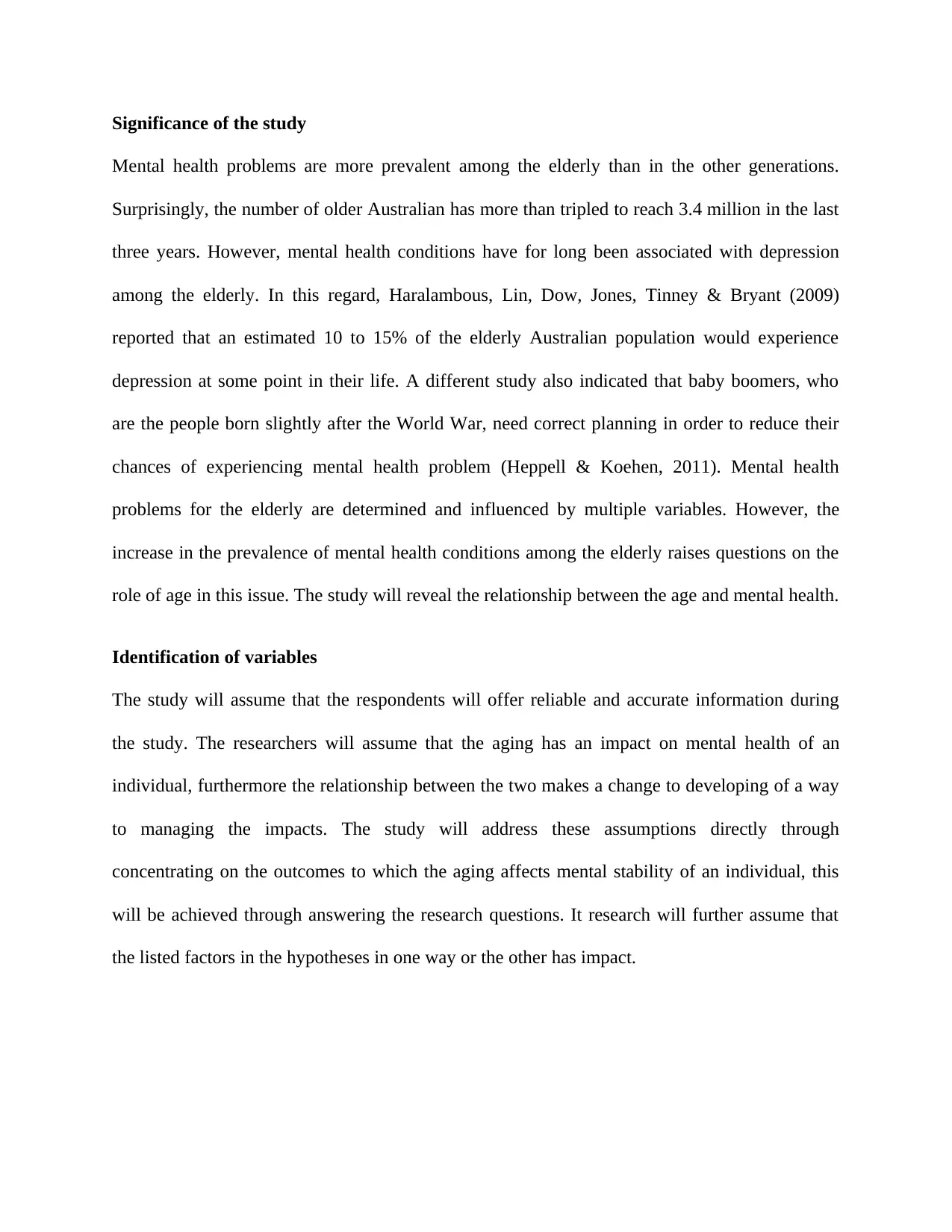
Significance of the study
Mental health problems are more prevalent among the elderly than in the other generations.
Surprisingly, the number of older Australian has more than tripled to reach 3.4 million in the last
three years. However, mental health conditions have for long been associated with depression
among the elderly. In this regard, Haralambous, Lin, Dow, Jones, Tinney & Bryant (2009)
reported that an estimated 10 to 15% of the elderly Australian population would experience
depression at some point in their life. A different study also indicated that baby boomers, who
are the people born slightly after the World War, need correct planning in order to reduce their
chances of experiencing mental health problem (Heppell & Koehen, 2011). Mental health
problems for the elderly are determined and influenced by multiple variables. However, the
increase in the prevalence of mental health conditions among the elderly raises questions on the
role of age in this issue. The study will reveal the relationship between the age and mental health.
Identification of variables
The study will assume that the respondents will offer reliable and accurate information during
the study. The researchers will assume that the aging has an impact on mental health of an
individual, furthermore the relationship between the two makes a change to developing of a way
to managing the impacts. The study will address these assumptions directly through
concentrating on the outcomes to which the aging affects mental stability of an individual, this
will be achieved through answering the research questions. It research will further assume that
the listed factors in the hypotheses in one way or the other has impact.
Mental health problems are more prevalent among the elderly than in the other generations.
Surprisingly, the number of older Australian has more than tripled to reach 3.4 million in the last
three years. However, mental health conditions have for long been associated with depression
among the elderly. In this regard, Haralambous, Lin, Dow, Jones, Tinney & Bryant (2009)
reported that an estimated 10 to 15% of the elderly Australian population would experience
depression at some point in their life. A different study also indicated that baby boomers, who
are the people born slightly after the World War, need correct planning in order to reduce their
chances of experiencing mental health problem (Heppell & Koehen, 2011). Mental health
problems for the elderly are determined and influenced by multiple variables. However, the
increase in the prevalence of mental health conditions among the elderly raises questions on the
role of age in this issue. The study will reveal the relationship between the age and mental health.
Identification of variables
The study will assume that the respondents will offer reliable and accurate information during
the study. The researchers will assume that the aging has an impact on mental health of an
individual, furthermore the relationship between the two makes a change to developing of a way
to managing the impacts. The study will address these assumptions directly through
concentrating on the outcomes to which the aging affects mental stability of an individual, this
will be achieved through answering the research questions. It research will further assume that
the listed factors in the hypotheses in one way or the other has impact.
Paraphrase This Document
Need a fresh take? Get an instant paraphrase of this document with our AI Paraphraser
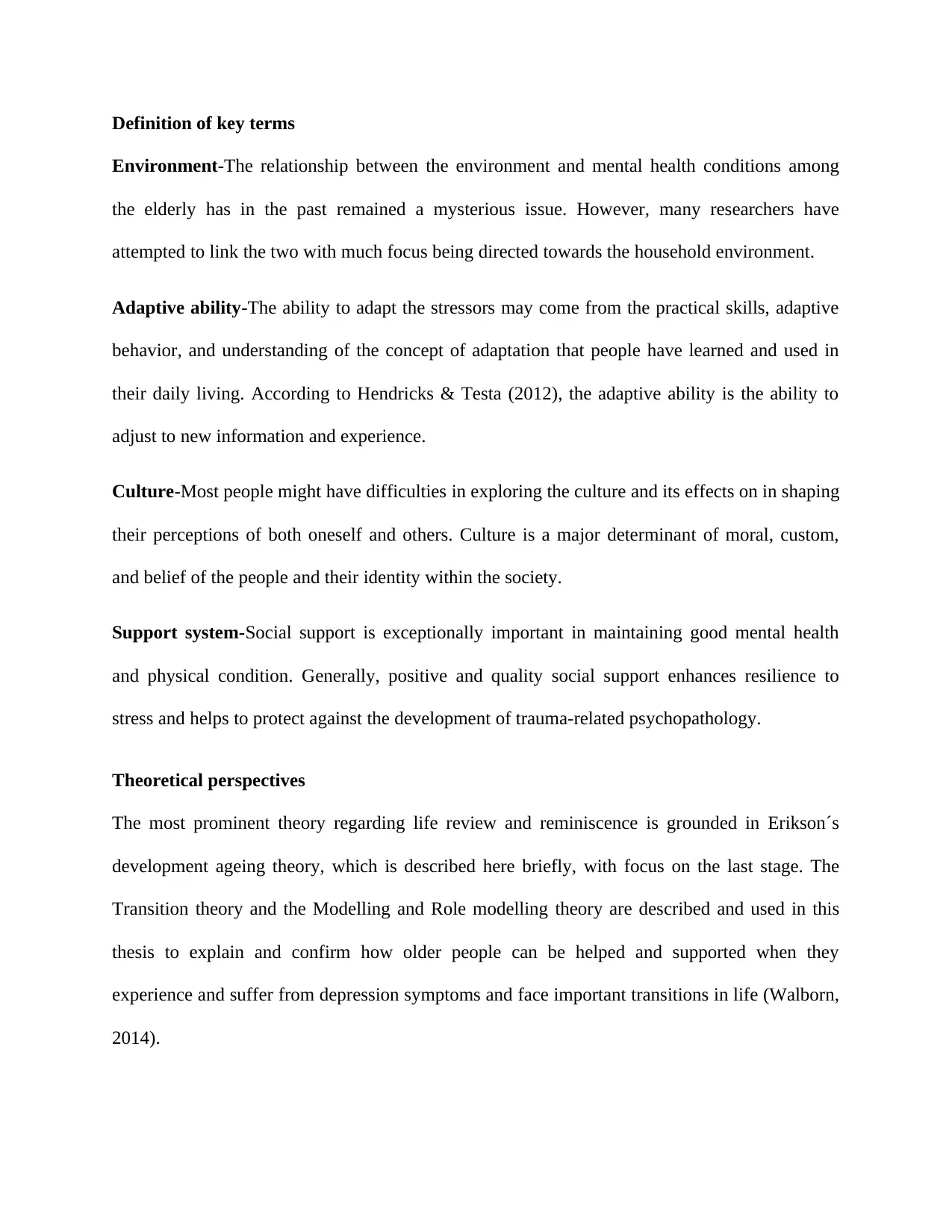
Definition of key terms
Environment-The relationship between the environment and mental health conditions among
the elderly has in the past remained a mysterious issue. However, many researchers have
attempted to link the two with much focus being directed towards the household environment.
Adaptive ability-The ability to adapt the stressors may come from the practical skills, adaptive
behavior, and understanding of the concept of adaptation that people have learned and used in
their daily living. According to Hendricks & Testa (2012), the adaptive ability is the ability to
adjust to new information and experience.
Culture-Most people might have difficulties in exploring the culture and its effects on in shaping
their perceptions of both oneself and others. Culture is a major determinant of moral, custom,
and belief of the people and their identity within the society.
Support system-Social support is exceptionally important in maintaining good mental health
and physical condition. Generally, positive and quality social support enhances resilience to
stress and helps to protect against the development of trauma-related psychopathology.
Theoretical perspectives
The most prominent theory regarding life review and reminiscence is grounded in Erikson´s
development ageing theory, which is described here briefly, with focus on the last stage. The
Transition theory and the Modelling and Role modelling theory are described and used in this
thesis to explain and confirm how older people can be helped and supported when they
experience and suffer from depression symptoms and face important transitions in life (Walborn,
2014).
Environment-The relationship between the environment and mental health conditions among
the elderly has in the past remained a mysterious issue. However, many researchers have
attempted to link the two with much focus being directed towards the household environment.
Adaptive ability-The ability to adapt the stressors may come from the practical skills, adaptive
behavior, and understanding of the concept of adaptation that people have learned and used in
their daily living. According to Hendricks & Testa (2012), the adaptive ability is the ability to
adjust to new information and experience.
Culture-Most people might have difficulties in exploring the culture and its effects on in shaping
their perceptions of both oneself and others. Culture is a major determinant of moral, custom,
and belief of the people and their identity within the society.
Support system-Social support is exceptionally important in maintaining good mental health
and physical condition. Generally, positive and quality social support enhances resilience to
stress and helps to protect against the development of trauma-related psychopathology.
Theoretical perspectives
The most prominent theory regarding life review and reminiscence is grounded in Erikson´s
development ageing theory, which is described here briefly, with focus on the last stage. The
Transition theory and the Modelling and Role modelling theory are described and used in this
thesis to explain and confirm how older people can be helped and supported when they
experience and suffer from depression symptoms and face important transitions in life (Walborn,
2014).
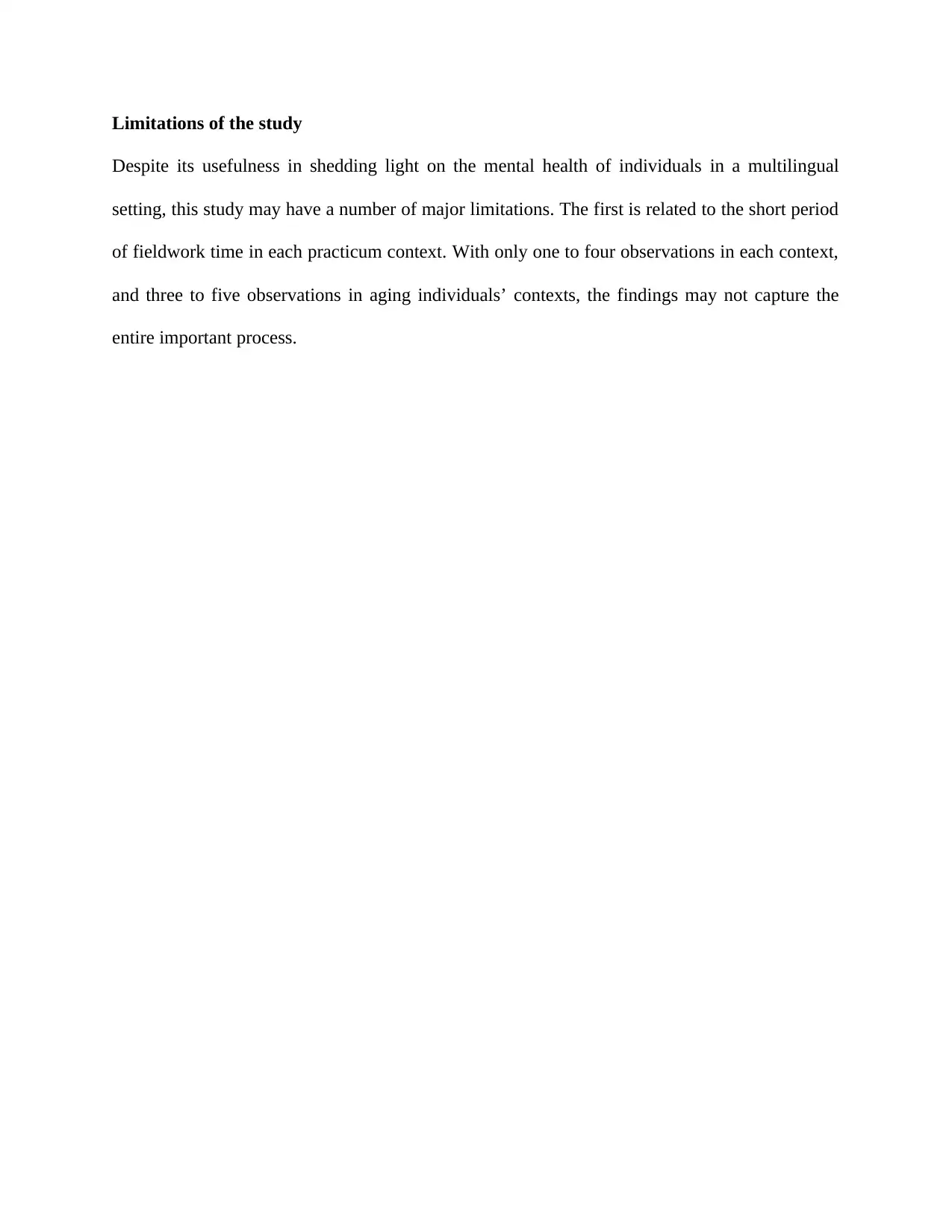
Limitations of the study
Despite its usefulness in shedding light on the mental health of individuals in a multilingual
setting, this study may have a number of major limitations. The first is related to the short period
of fieldwork time in each practicum context. With only one to four observations in each context,
and three to five observations in aging individuals’ contexts, the findings may not capture the
entire important process.
Despite its usefulness in shedding light on the mental health of individuals in a multilingual
setting, this study may have a number of major limitations. The first is related to the short period
of fieldwork time in each practicum context. With only one to four observations in each context,
and three to five observations in aging individuals’ contexts, the findings may not capture the
entire important process.
⊘ This is a preview!⊘
Do you want full access?
Subscribe today to unlock all pages.

Trusted by 1+ million students worldwide
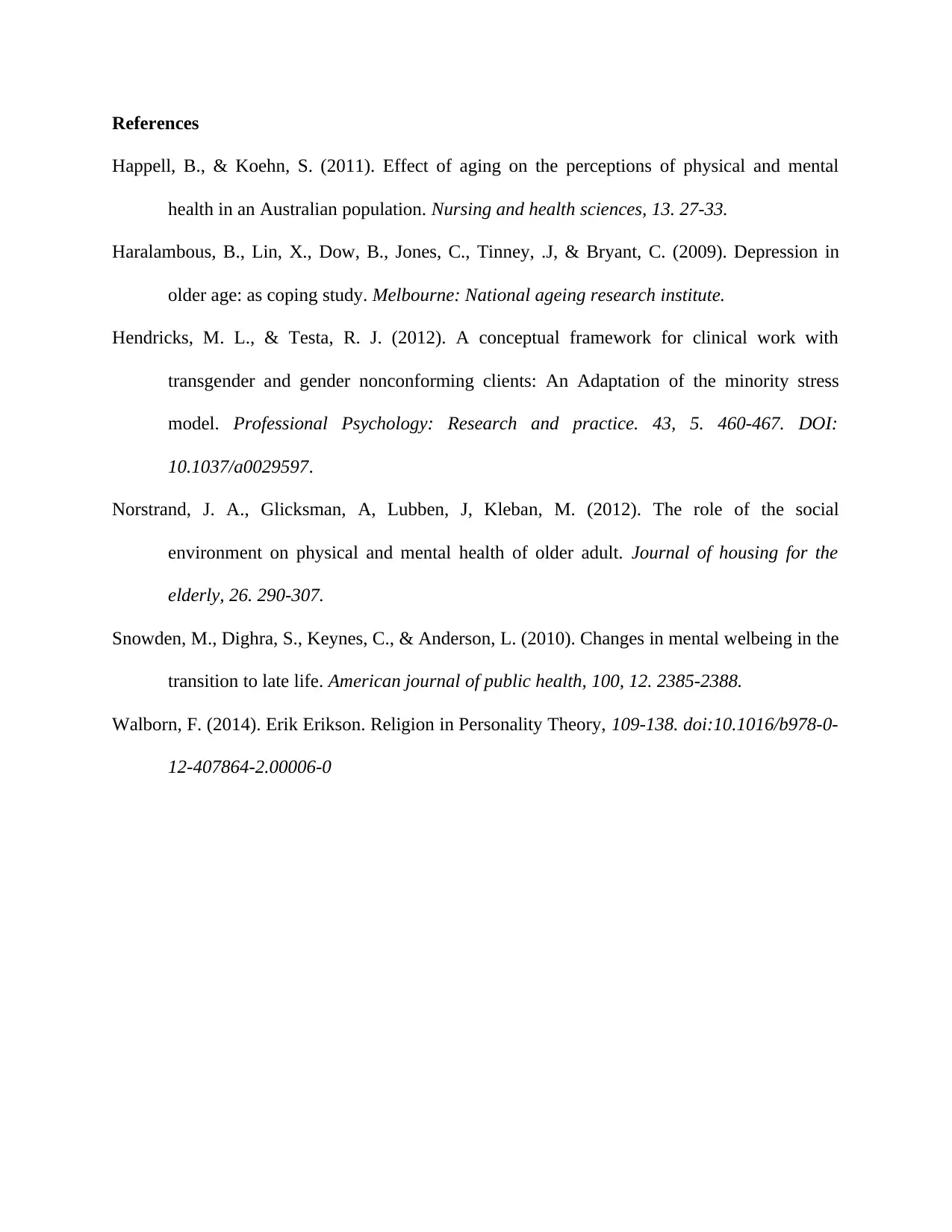
References
Happell, B., & Koehn, S. (2011). Effect of aging on the perceptions of physical and mental
health in an Australian population. Nursing and health sciences, 13. 27-33.
Haralambous, B., Lin, X., Dow, B., Jones, C., Tinney, .J, & Bryant, C. (2009). Depression in
older age: as coping study. Melbourne: National ageing research institute.
Hendricks, M. L., & Testa, R. J. (2012). A conceptual framework for clinical work with
transgender and gender nonconforming clients: An Adaptation of the minority stress
model. Professional Psychology: Research and practice. 43, 5. 460-467. DOI:
10.1037/a0029597.
Norstrand, J. A., Glicksman, A, Lubben, J, Kleban, M. (2012). The role of the social
environment on physical and mental health of older adult. Journal of housing for the
elderly, 26. 290-307.
Snowden, M., Dighra, S., Keynes, C., & Anderson, L. (2010). Changes in mental welbeing in the
transition to late life. American journal of public health, 100, 12. 2385-2388.
Walborn, F. (2014). Erik Erikson. Religion in Personality Theory, 109-138. doi:10.1016/b978-0-
12-407864-2.00006-0
Happell, B., & Koehn, S. (2011). Effect of aging on the perceptions of physical and mental
health in an Australian population. Nursing and health sciences, 13. 27-33.
Haralambous, B., Lin, X., Dow, B., Jones, C., Tinney, .J, & Bryant, C. (2009). Depression in
older age: as coping study. Melbourne: National ageing research institute.
Hendricks, M. L., & Testa, R. J. (2012). A conceptual framework for clinical work with
transgender and gender nonconforming clients: An Adaptation of the minority stress
model. Professional Psychology: Research and practice. 43, 5. 460-467. DOI:
10.1037/a0029597.
Norstrand, J. A., Glicksman, A, Lubben, J, Kleban, M. (2012). The role of the social
environment on physical and mental health of older adult. Journal of housing for the
elderly, 26. 290-307.
Snowden, M., Dighra, S., Keynes, C., & Anderson, L. (2010). Changes in mental welbeing in the
transition to late life. American journal of public health, 100, 12. 2385-2388.
Walborn, F. (2014). Erik Erikson. Religion in Personality Theory, 109-138. doi:10.1016/b978-0-
12-407864-2.00006-0
1 out of 7
Related Documents
Your All-in-One AI-Powered Toolkit for Academic Success.
+13062052269
info@desklib.com
Available 24*7 on WhatsApp / Email
![[object Object]](/_next/static/media/star-bottom.7253800d.svg)
Unlock your academic potential
Copyright © 2020–2026 A2Z Services. All Rights Reserved. Developed and managed by ZUCOL.





